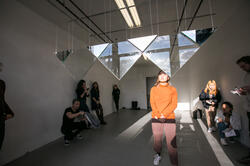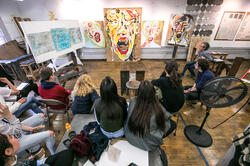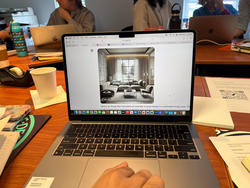News & Events
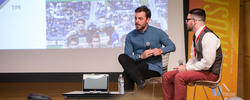
T&LL News & Events
Do you have questions about assignments, grading, and giving feedback in Canvas?
Do you have questions about AI detectors, plagiarism, and academic integrity?
Join our online Q&A session. Open to all RISD faculty.
“Critique Cross-Talk” is an open space to hear from students about their experiences with critique at RISD and to invite faculty to share their thoughts and responses.
In the last session of this workshop series, faculty will together review, refine, and reimagine critique tools and practices in ways that fit their teaching objectives and that are informed by the conversation throughout the series.
Faculty Workshop Series
Syllabus Swap: Strategies for Inclusive Teaching
The "Syllabus Swap" sessions provide space, time, and tools for reflection on, peer-to-peer review of, and revision of syllabus and course components that center inclusive teaching and learning. The workshops aim to help faculty:
- get access to tools and insights for reflective teaching
- “audit” the accessibility and diversity of course components and materials and identify areas for improvement
- identify strategies and practical steps for inclusive feedback and critique, classroom/studio interactions, and grading and assessment
- review and redesign syllabus statements, course policies, and teaching strategies

Inclusive Critique and Feedback
The "Inclusive Critique and Feedback" discussion-based sessions are open to all faculty interested in sharing insights and experiences on the ways they define and use inclusive critique and feedback methods.
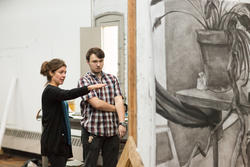
Syllabi and Course Design in the Age of AI
These workshops address different approaches, challenges, possibilities and types of digital labor involved in designing a syllabus in our age of born-digital, machine readable, or machine generated content. AI, seen by many as a major disruptive force in higher education pedagogy, has already triggered a wide range of responses from strong skepticism to excitement. Despite valid concerns and criticism, the emergence of new AI tools is the latest, and clearest, signal of transitioning to a new digital environment for producing course content and, more broadly, types of knowledge that cannot be ignored by teachers. This new condition invites reflection on the function and purpose of what we call a “syllabus” but also presents some new possibilities in designing a course that are worth exploring. What should a syllabus look like? What are its key components? How can we build a machine-readable syllabus? Should we redesign assignments or rethink assessment in light of machine-generated content? How do we account for and communicate the ethical issues and questions of accessibility, labor, time, and workload involved in designing course content both for faculty and students?


